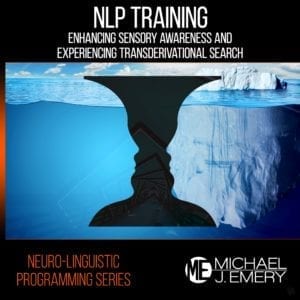Neuro-linguistic programming therapists help people affected with various disorders using NLP therapy patterns. NLP therapy helps an individual to overcome the obstacles that they have in their communication with oneself and others. This therapy helps people realize their potential as individuals. It also helps them develop their ability to utilize new skills based on their interests. By practicing neuro-linguistic programming techniques, an individual gains self-confidence, improves his interpersonal relationships, releases non-beneficial behaviors, and harnesses professional capacities.
The presenting individual arrives in the "present" state with limiting beliefs and a non-beneficial paradigm. The goal is to help this person get into the desired state which expands into a new paradigm.
NLP therapy online is sufficient for most people. Neuro-linguistic (NLP) treatment is often misunderstood. In fact, some people who have heard about NLP are not sure what it is. Neuro-linguistic means 'neurology', 'psychology' or 'mind' associated with language. So, NLP is basically a branch of psychology. NLP was developed by two therapists in California: Richard Bandler and John Grinder.
Neuro-linguistic programming therapists help people affected with various disorders using neuro-linguistic patterns that are natural to the person's body/mind. It helps them overcome the obstacles that they have in their communication with others. This therapy helps people realize their potential as individuals. It also helps them develop their ability to utilize new skills based on their interests. By practicing neuro-linguistic programming, an individual gains self-confidence and improves his interpersonal relationships.
A neuro-linguistic therapist helps their clients achieve personal goals by helping them change the way they think and act. They assist their clients to realize their full potentials and develop interpersonal skills by giving them realistic feedback on how they are communicating with others. They help clients overcome dysfunctional issues such as shame, fear, guilt, anger, and ignorance.
How does NLP help? A neuro-linguistic therapist helps their clients to improve their communication skills by helping them change the negative self-talk that they usually say to themselves. The therapist will identify the areas of the clients' life where these negative self-talk patterns are most common and suggest ways to change the negative thoughts and replace them with more positive ones. They also assist their clients to break bad habits such as lying, theft, and violent tendencies. In addition, they assist their clients to improve their work performance through training, providing strategies for better organizational skills, and improving job satisfaction through role play and role modeling.
How do therapists know if they are helping their clients? Usually, a neuro-linguistic therapist monitors how their clients respond and react to situations. Based on their observations, they determine whether or not their clients are receiving adequate feedback and may refer their clients to a professional psychiatrist for additional help. The therapists should also be attentive to any signs that their clients are withdrawing from society due to anxiety or depression.
What are the benefits of neuro-linguistic programming therapy? First, Neuro-linguistic therapists help clients identify how their thought patterns and behavior contribute to patterns of societal behavior. For instance, neuro-linguistic therapists can help their clients change their negative beliefs (their "secretaries") of how they view the world and others. By changing or reducing their secret agents, clients become more aware of how they communicate with others, their attitudes towards relationships, and their decision-making processes. This type of therapy is based on the belief that our thoughts, feelings, and reactions to the events and situations that occur in our day-to-day lives, affect how we perceive the world. Hence, if we can change our innermost thoughts and feelings about a situation, we can change the way people experience that situation.
Neuro-linguistic therapists also use neuro-linguistic programming (NLP) techniques to alter clients' behavior and thought processes. NLP is an effective tool that helps clients make changes in their thinking without necessarily changing their basic personalities. For instance, instead of saying, "My ex is coming to town tomorrow night," a client might say, "I am meeting my ex tomorrow night for an evening of piano practice." In this example, instead of "my ex is coming to town tomorrow night," the term used would be "the evening of piano practice." The meaning of each word differs, yet both phrases have the same meaning: I am meeting my ex for an evening of piano practice.
Neuro-linguistic programming therapy is often used by therapists, counselors, and psychologists due to its effectiveness. The neuro-linguistic principles are relatively easy to apply, simple to comprehend, and can produce powerful results. Unlike other modalities such as hypnosis, Neuro-linguistics does not require the client to remain in a reclined, silent, or even stationary position. The neuro-linguistic therapist guides the client through his thoughts and helps him to perceive and respond to his experiences in an open and accepting manner.
Showing all 120 results
























































































































Explore audio program categories utilizing the best techniques in neuro-linguistic programming, Ericksonian hypnosis, brainwave frequencies, and guided visualization.